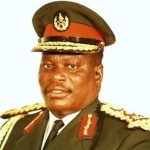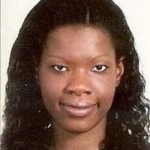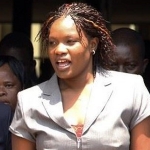Background
Joice Mujuru was born in Mount Darwin on 15 April 1958, at Mashonaland Central, in northeastern Zimbabwe. She was one of 12 children born to her parents.

549 Arcturus Road, Harare, Zimbabwe
Joice Mujuru has a Bachelor's and a Master's degree in Management and Entrepreneurial Studies from Zimbabwe Women's University in Africa.
630 Churchill Avenue, Harare, Zimbabwe
On the 12th September 2014, Joice graduated with a Ph.D. from the University of Zimbabwe Faculty of Arts Department of Philosophy.













Joice Mujuru was born in Mount Darwin on 15 April 1958, at Mashonaland Central, in northeastern Zimbabwe. She was one of 12 children born to her parents.
Joice Mujuru has a Bachelor's and a Master's degree in Management and Entrepreneurial Studies from Zimbabwe Women's University in Africa. On the 12th September 2014, Joice graduated with a Ph.D. from the University of Zimbabwe Faculty of Arts Department of Philosophy. The thesis was titled "A strategic Exploratory Entrepreneurship Study of Sustainable Agricultural Business; Case Studies of Mitchel and Mitchel of Mashonaland East and Dotito Scheme of Mashonaland Central Province" and was said to be available at the University of Zimbabwe library. Her Ph.D. thesis focused on Mitchel and Mitchel an agricultural Company based on the farming town of Marondera in Mashonaland East Province. The company is a commercial venture and it produces horticultural projects which are imported to international markets for sale. She was capped by the President of the Republic of Zimbabwe Robert Mugabe. She graduated together with the first lady Grace Mugabe who earned a Ph.D. in Sociology.
Joice Mujuru left Rhodesia to join the Zimbabwe African National Union (ZANU) in Zambia, which was waging a guerrilla war against the lan Smith regime of Rhodesia. At the age of eighteen, she was the only woman who, along with fifteen men, trained in Lusaka. She trained in light infantry for three months, using A К rifles and submachine guns. She also trained for six months as a medical assistant. Still only eighteen years old, she was promoted to the General Staff and given political instruction. By 1975 she had become the political instructor of two successive military bases (75 percent of all political instructors in ZANU were women). At age twenty-one, she became camp commander at Chimoio military and refugee camp in Mozambique. She then became military commander of the ZANLA Women's Detachment, and in 1976 she was appointed the director of politics in Chibawawa refugee camp.
At some point in her young career, Joice Mujuru adopted the revolutionary name of Teurai Ropa (Spill Blood). In 1977 in Mozambique, at the age of twenty-two, she became the youngest member of the Central Committee and was on the National Executive. She was then appointed a secretary of women's affairs. As a politically active woman, Teurai Ropa became a prime target for the Rhodesian security forces, which unsuccessfully tried to capture her.
In 1978, when the camp she was in was attacked by Rhodesian soldiers, Teurai Ropa was an active combatant despite being in a late stage of pregnancy; two days later she gave birth. Her daughter, Priscilla Rungano, was sent away one month later and Teurai Ropa continued to fight until liberation was won in 1980. In newly independent Zimbabwe, while representing the Mashonaland Central Constituency, Teurai Ropa served briefly as minister of youth, sport, and recreation. In 1981 she became minister of community development and women's affairs.
Her pinnacle was the 2004 Zanu PF congress where against all odds she was elevated to become the first vice-president of the party and subsequently state Vice-President.
Mugabe’s hand was visible in her elevation at the 2004 congress when he, at the eleventh hour, manipulated the party constitution to say one of the three members of the presidium should be a woman. Political analysts and commentators have argued that the amendments were done to deny Zanu PF legal affairs secretary Emmerson Mnangagwa the opportunity to become the Vice-President and potential Mugabe successor despite him having then bagged eight provincial nominations.
Mugabe then even suggested that Mujuru could become the party leader in the future when he rhetorically asked the congress if it wanted Mujuru to remain on that position or that she could aspire higher. Many then concluded Mugabe had chosen his heir apparent.
Other analysts, however, insist her rise was influenced by her late husband Retired General Solomon Mujuru. General Mujuru was the behind-the-scenes kingmaker in Zanu PF.
Mujuru was duly re-elected at the 2009 congress and it all but seemed that her ascendancy to the throne was sealed.
However, three months after the Youths and Women’s League conferences ahead of the 2014 congress, Mujuru’s fortunes changed dramatically. The architect of her demise was Mugabe’s wife, Grace.
The First Lady, with Mugabe’s complicity, has held nationwide rallies where she has attacked Mujuru labeling her as incompetent, corrupt and divisive. The attacks were vicious and personal. Grace even called on Mujuru to resign or face humiliation at the congress.
With three days before the 2014 congress commences, Mujuru seems down after she was blocked from filing her nomination to contest for the powerful central committee seat and the last-minute amendments that allow Mugabe the right to appoint his own deputies and national chairman.
Political analysts argue that while Mujuru’s political end seems certain she may survive in the party but in a weakened position.
The world is full of comebacks and Zimbabwe waits to see if Mujuru will have her own "Lazarus moment."
Joyce Mugari Nhongo became a heroine for thousands of black women who fought in the liberation struggles in Africa.
One of the greatest achievements Mujuru made was in 1980 when she was appointed cabinet minister at a very young age. She was one of the few women who managed to establish influence in the Zimbabwean political landscape when the country was just coming from war. In 2004, she made a landmark when she was appointed vice president after the death of Simon Muzenda.
In late 2014, Mujuru was accused of plotting against Mugabe and became an outcast within ZANU-PF. She lost her positions in the party leadership at the December 2014 congress, and shortly afterward, on 8 December 2014, Mugabe dismissed her from her post as Vice-President, along with ministers who were identified with her faction. In comments published on 9 December, the same day the dismissals were announced, Mujuru said that the claims that she had plotted against Mugabe were "ridiculous."
On 10 December 2014, Mugabe appointed Mujuru's long-time rival in the succession battle, Emmerson Mnangagwa, to replace her as Vice-President.
Mujuru was expelled from ZANU-PF on 3 April 2015 and subsequently moved on to form the Zimbabwe People First party, in opposition to ZANU-PF. In 2017 after expelling seven senior members of the Zimbabwe People First party, she changed its name to the National People's Party when the expelled members challenged ownership of the Zimbabwe People First name. National People's Party was created with a promise to revive Zimbabwe’s toxic economy by repairing ties severed with the West, as infighting threatens to consume the nation’s political elite.
Joice Mujuru fought in Zimbabwe (formerly Rhodesia) against colonialism, racism, and oppression so that Africans would not have to be slaves on their own land.
The "better Zimbabwe," she believes, will prioritize emotional well-being. Among the country’s problems are an economy in shambles and a history of human rights abuses. Citizens must focus on healing, Mujuru says.
"I want to work together with Zimbabweans, in order to achieve the better Zimbabwe that we want."
"It’s important that if things are bad, you don’t have to just hide them. But there are things when we say and we talk about them in-house, and you expect your friends to correct them in-house, but when they fail to correct them, obviously you now have to say them."
"These are the people who can’t find jobs, who can’t afford fees for their children. l would want to see them going to inspect the voters’ roll... and going to vote to change this government because without that we are not going to see any change."
"Rape, Abuse and Gender-Based Violence shouldn't be taken lightly in society. The younger generation is watching, listening and learning, by ignoring such issues is teaching the younger generation that you can get away with such issues, hence not putting an end to this."
"I only count 3 women, one is not head of state, one has resigned and the other her term is coming to a close. We need more women on the world stage."
"The situation in the country has reached another level. We keep repeating the same mistake."
"I thank God he has been faithful to me and my family. He has been my comforter, my counselor in dark time, without him l wouldn't be here today. Every Cde, Friend and Family l look forward to sharing more precious moments like today in my life. Celebrating more Birthday. Thank you."
Quotes from others about the person
"Once this is achieved, her next stage is to empower traditional leaders as custodians of people’s cultures and values. This, as far as I am concerned, will revive the people’s identity infuse cultural values and practices, which in themselves are inherent social-conscience-policing tools." - Mnyandu
"She has not done anything for the country during the time she was in government and even after she left government. I do not see her being able to change the economy for the better of the nation." - Tapiwa Nyoni
In 1977 Joyce was married to General Solomon Mujuru, who enjoyed great respect among the security forces before dying in a fire at his farm in mysterious circumstances in 2011. Mujuru has since claimed he was murdered by unknown political opponents.
Their chidren are Nyasha Del Campo, Chipo Makoni, Kumbirai Mujuru, Kuzivakwashe Mujuru.

Solomon Mujuru was a Zimbabwean military officer and politician who led Robert Mugabe's guerrilla forces during the Rhodesian Bush War. He was from the Zezuru clan. In post-independence Zimbabwe, he went on to become an army chief before leaving government service in 1995. After leaving his post in the Zimbabwe National Army, he got into politics becoming Member of Parliament for Chikomba on a Zanu PF ticket. He was generally regarded as one of the most feared men in Zimbabwe.


